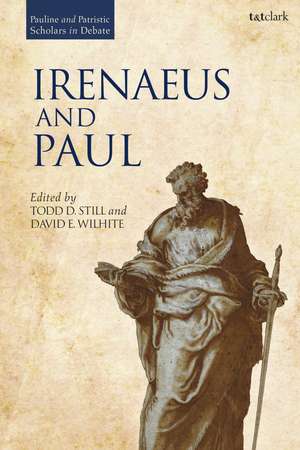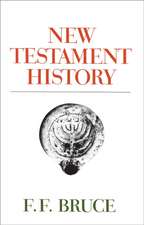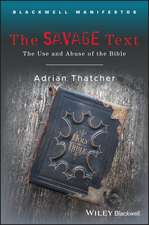Irenaeus and Paul: Pauline and Patristic Scholars in Debate
Editat de Dr David E. Wilhite, Todd D. Stillen Limba Engleză Hardback – 19 feb 2020
| Toate formatele și edițiile | Preț | Express |
|---|---|---|
| Paperback (1) | 220.02 lei 6-8 săpt. | |
| Bloomsbury Publishing – 20 oct 2021 | 220.02 lei 6-8 săpt. | |
| Hardback (1) | 716.96 lei 6-8 săpt. | |
| Bloomsbury Publishing – 19 feb 2020 | 716.96 lei 6-8 săpt. |
Preț: 716.96 lei
Preț vechi: 1029.07 lei
-30% Nou
Puncte Express: 1075
Preț estimativ în valută:
137.19€ • 143.53$ • 113.96£
137.19€ • 143.53$ • 113.96£
Carte tipărită la comandă
Livrare economică 02-16 aprilie
Preluare comenzi: 021 569.72.76
Specificații
ISBN-13: 9780567672872
ISBN-10: 0567672875
Pagini: 328
Dimensiuni: 156 x 234 x 25 mm
Greutate: 0.61 kg
Editura: Bloomsbury Publishing
Colecția T&T Clark
Seria Pauline and Patristic Scholars in Debate
Locul publicării:London, United Kingdom
ISBN-10: 0567672875
Pagini: 328
Dimensiuni: 156 x 234 x 25 mm
Greutate: 0.61 kg
Editura: Bloomsbury Publishing
Colecția T&T Clark
Seria Pauline and Patristic Scholars in Debate
Locul publicării:London, United Kingdom
Caracteristici
Leading scholars from Patristics and New Testament studies present specially commissioned studies in a closely focussed collection
Notă biografică
Todd D. Still is Charles J. and Eleanor McLerran DeLancey Dean and William M. Hinson Professor of Christian Scriptures in the George W. Truett Theological Seminary of Baylor University, USA.David Wilhite is Associate Professor of Christian Theology at Baylor University, USA.
Cuprins
List of ContributorsPreface1. Irenaeus and Paul: An Introduction - David E. Wilhite, Baylor University, USA2. Irenaeus and Opponents on Creator, Creation and the Apostle - Michael A. Williams, University of Washington, USA3. Response: Paul, Ireaneus, and the Creation in Dialogue with Michael A. Williams - Jason Maston, Houston Baptist University, USA4. The Use of Paul in Irenaeus's Christology - Stephen O. Presley, Southwestern Baptist Theological Seminary, USA5. Response: Messiah Christology in Paul and Irenaeus - Joshua W. Jipp, Trinity Evangelical Divinity School, USA.6. The Personal/Substantial Spirit of Prophecy: Irenaeus's Use of Paul Against the Heresies - David E. Wilhite, Baylor University, USA7: Response: Irenaeus's Use of Paul on the Spirit: A Response to David E. Wilhite - Craig Keener, Asbury Theological Seminary, USA. 8. On Sin: Irenaeus's Appropriation of Paul - Thomas J. Holsinger-Friesen, Spring Arbor University, USA9. Response: On Sin in Irenaeus's Appropriation of Paul: A Response to Tom Hosinger-Friesen - Jutta Leonhardt-Balzer, University of Aberdeen, UK10. The Covenant of Promise: Abraham in Irenaeus - Benjamin Blackwell, Houston Baptist University, USA.11. Response: Irenaeus, Abraham, Covenants and the One Thing Needful: The Second Adam - Mark W. Elliot, University of St. Andrews, UK.12. Teaching the Rule of Faith in Love: Irenaeus on 1 Corinthians 8:1 - Scott D. Moringiello, DePaul University, USA13. Response: Being Known by God: A Response to Scott D. Moringiello - Carla Works, Wesley Theological Seminary, USA14. Irenaeus and Paul: Sexuality, Virginity, and Women - Helen Rhee, Westmont University, USA15. Response: Irenaeus's Reception of Pauline Teaching on Sexuality, Virginity, and Women: A Response to Helen Rhee - Judith Gundry, Yale Divinity School, USA16. Paul and the Jerusalem Church in Irenaeus's Against Heresies - Benjamin White, Clemson University, USA17. Response: Irenaeus, Jerusalem, and Remembering the Poor: A Response to Benjamin White - Bruce W. Longenecker, Baylor University, USA18. Paul in Irenaeus on the Last Things - A. Y. Collins, Yale Divinity School, USA19. Response: Appropriating Paul: Irenaeus's Use of the Apostle in Forming and Expressing His Eschatological Thought - Todd D. Still, Baylor University, USAIndex
Recenzii
These stimulating conversations between scholars at home in Irenaeus's thought and those from a Pauline stable make a valuable contribution to an understanding of both thinkers. But more than this, they take us beyond a linear view of Pauline reception, and binary models of whether Irenaeus got Paul 'right' or 'wrong', to a more measured reflection on the contextualization of all interpretation, and of the potential of Paul - and of Irenaeus- for new readings in the face of new challenges.














